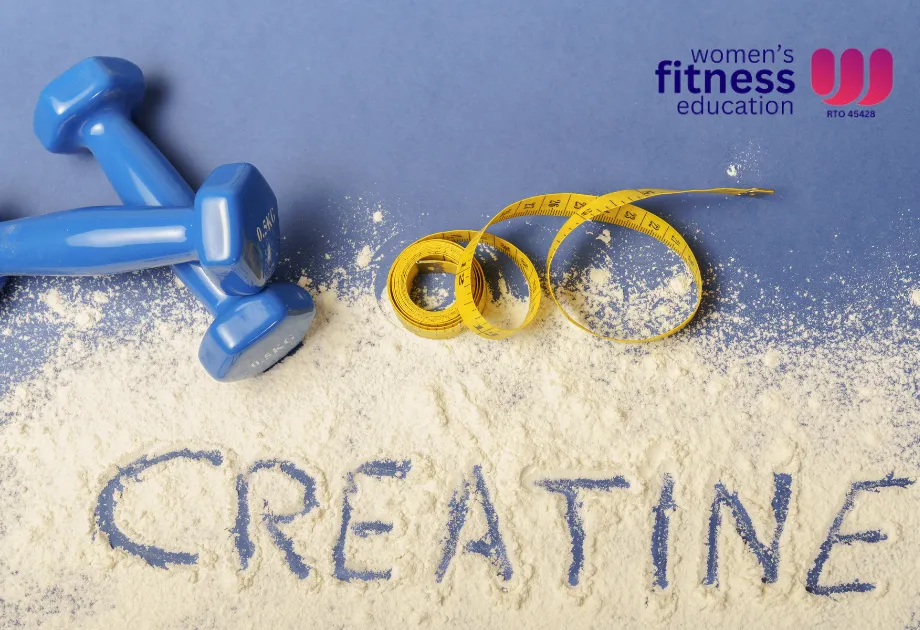Women's Fitness Blog

The Benefits of Creatine for Women
When it comes to health and fitness supplements, creatine often pops up as a powerhouse for enhancing athletic performance. However, many women shy away from it, thinking it’s only for bodybuilders or fearing it might make them "bulk up." The reality? Creatine can be a game-changer for women, offering a range of benefits from improving strength to enhancing brain health.
What is Creatine?
Creatine is a naturally occurring compound found in small amounts in food like red meat and fish, and it’s also produced by the body. It plays a crucial role in the production of adenosine triphosphate (ATP), which is the primary energy source for muscle contractions. As a result, creatine supplementation helps replenish the energy supply in muscles, especially during short bursts of intense exercise, like weight lifting or sprinting.
Common Myths About Creatine for Women
Before diving into the benefits, it’s important to address some common myths that discourage women from trying creatine:
Creatine will make you bulky: Contrary to popular belief, creatine doesn't lead to significant muscle mass gains unless you follow an intense bodybuilding regimen. For women engaging in regular fitness activities, creatine primarily improves strength and endurance.
Creatine causes bloating: While some women may experience slight water retention when first starting creatine, it typically subsides as the body adjusts. This water retention is usually stored in muscles, making them appear fuller, not bloated.
Creatine is only for athletes: While athletes often use creatine for performance, its benefits extend far beyond sports. Women who are into general fitness, strength training, or even just looking for cognitive enhancement can benefit from it.

Top Benefits of Creatine for Women
1. Improved Strength and Muscle Tone
One of the most well-documented benefits of creatine is its ability to improve strength. For women who are focused on strength training, resistance workouts, or high-intensity interval training (HIIT), creatine can enhance performance by providing an energy boost. This leads to increased reps, heavier lifts, and faster muscle recovery.
With more effective workouts, you'll likely see improvements in muscle tone without becoming "bulky." Creatine helps develop lean muscle, which can enhance body composition by increasing muscle definition and decreasing fat mass.
2. Enhanced Endurance and Workout Performance
Creatine isn't just about short bursts of energy—it can also improve endurance during aerobic exercises like running, cycling, or swimming. By boosting your body's ability to produce ATP, creatine ensures that your muscles have the energy they need to keep going for longer. This makes it easier to push through tough cardio sessions or maintain stamina during high-volume workouts.
3. Faster Recovery
Post-workout soreness and fatigue can slow down your progress. Creatine has been shown to aid in muscle recovery by reducing the buildup of lactic acid and decreasing muscle cell damage after exercise. Faster recovery means you can hit the gym more frequently, maintain your workout consistency, and avoid burnout.
4. Supports Brain Health
Creatine isn't just for your muscles—it benefits your brain as well. Research has shown that creatine can enhance cognitive function, improve memory, and potentially reduce mental fatigue. This is particularly important for women as they age, as cognitive decline is a major concern. By supporting energy production in the brain, creatine may help maintain mental sharpness and improve focus.
5. Helps with Aging
As women age, they naturally lose muscle mass (a condition known as sarcopenia). This can lead to decreased strength, balance, and overall physical function. Creatine supplementation can help mitigate age-related muscle loss by preserving lean muscle mass and supporting bone health. In this way, creatine can play a vital role in promoting longevity and maintaining quality of life as women grow older.
6. Supports Hormonal Health
There’s emerging research suggesting that creatine might have positive effects on hormone regulation in women, particularly in relation to reproductive health. For example, creatine could help women better manage symptoms of conditions like Polycystic Ovary Syndrome (PCOS), though more research is needed to solidify these findings.

How to Use Creatine as a Woman
When it comes to dosage, women don’t need to follow different guidelines from men. The typical recommended dose is:
Loading phase (optional): 20 grams of creatine per day (split into 4 doses) for the first 5–7 days.
Maintenance phase: 3–5 grams of creatine daily.
The loading phase helps saturate your muscles with creatine quickly, but it’s not necessary—taking a consistent 3–5 grams per day over time will still yield great results. Creatine monohydrate is the most studied and widely recommended form of creatine, known for its efficacy and safety.
Potential Side Effects
Creatine is one of the most researched supplements, and studies show it’s safe for both short- and long-term use. The most common side effect is mild water retention, which is temporary. It's crucial to stay well-hydrated when using creatine, as it pulls water into your muscle cells.
Some women may experience stomach discomfort if they take too much at once, so it's better to spread the dosage throughout the day during the loading phase. If you have any underlying kidney issues, consult a healthcare professional before starting creatine supplementation.
Our Final Thoughts…
For women looking to enhance their fitness performance, boost strength, improve recovery, and even support cognitive function, creatine is a valuable, safe, and effective supplement. Far from making you bulky, it helps build lean muscle, increases endurance, and may even play a role in long-term health, especially as women age. If you're still on the fence, give creatine a try for a month—you might be surprised at the results!
By adding creatine to your supplement routine, you’ll unlock new levels of physical and mental performance, setting yourself up for long-term health and vitality.
PS. If you’re interested in becoming a Personal Trainer, check out our Certificate III and IV in Fitness
Sources:
Tarnopolsky, M. (2020). Creatine as a Therapeutic Strategy for Myopathies and Other Neuromuscular Conditions.
Rawson, E. S., et al. (2011). Creatine Supplementation and Its Effects on Muscle, Brain, and Health.

